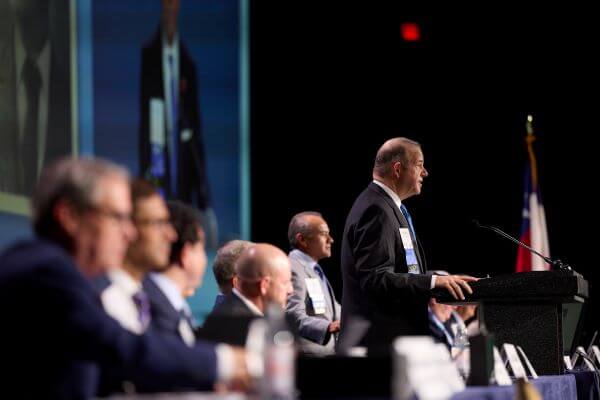
With an eye toward strengthening the Texas Medical Association and the Texas physician practices it represents, the House of Delegates approved a handful of new policies that include a phased-in dues increase and a standing committee on independent practice.
The increase is the first to occur in five years and will roll out in $25 increments in 2025 and 2026, for a total raise of $50 per active member over the next two years.
Historically, TMA has raised dues for active members every few years to keep up with inflationary costs of salaries, health insurance, and other operational expenses. Because of the COVID-19 pandemic and its impact on physicians and their practices, however, the association forewent such a raise in recent years.
“As Texas physicians work in new and increasingly varied settings, the challenge grows for TMA to provide value to the state’s diverse physician population. We must meet that challenge,” TMA Treasurer Greg Fuller, MD, told the house at TexMed 2024, held in Dallas May 2-4.
“We must provide advocacy and services that meet the needs of large group and solo practitioners, of physicians who work as a part of nationwide single-specialty groups, of rural and inner-city physicians, of employed physicians, of the new breed of physician-entrepreneurs, and of those who teach the next generation of physicians while simultaneously being asked to generate practice income. As you are asked to do more and more, often with less income, so is your association.”
Reinforcing the need to bolster independently practicing physicians amid economic consolidation, delegates also voted in favor of establishing a standing Committee on Independent Practice that reports to the TMA Board of Trustees. The move comes at a time when 34% of Texas physicians are in independent settings and 66% are employed, whether by hospitals, health systems, or other corporate entities, according to the Physicians Advocacy Institute.
“The backbone of health care starts at the private practice level,” TMA President Ray Callas, MD, told a roomful of physicians at the Independent Practice Physicians Forum held May 3 during TexMed. “The more health plan and hospital mergers [occur], the more physicians get squeezed out of a dollar, and the less [access to care] patients get.”
Austin ophthalmologist Michelle Berger, MD, and Bridge City family physician Amy Townsend, MD, will serve as inaugural leaders of the Committee on Independent Practice.
Dr. Townsend called her recent transition from hospital-based care to direct primary care “life-changing.” Also speaking at the forum, she said it “kept me in medicine. I’m not sure I would have stayed had there not been this option.”
Dr. Berger added: “We want to help you find the way you want to practice.”
As of this writing, TMA leaders were in the process of appointing additional committee members to the 15-person body with regional representation of varying practice sizes and types.
House delegates also voted to ensure Texas medicine is represented at the national level by adopting new policy that focuses on increasing American Medical Association membership among TMA members – particularly board, council, and committee members – “with the goal of making Texas the largest state delegation within AMA.”
According to the latest 2023 data, about 34% of TMA members are AMA members. In 2022, Texas had fewer apportioned AMA delegates, and therefore “less of a voice at the AMA house,” than states with fewer members than TMA, per the original resolution filed that led to the new policy.
While acknowledging past misalignments between TMA and AMA policy, San Antonio pathologist David Henkes, MD, said the bigger Texas’ influence within AMA, the more weight the state carries when it comes to national policymaking. The chair of the Texas Delegation to the AMA testified on his own behalf during reference committee hearings held in the run-up to house voting.
“TMA and AMA are organizations for all physicians,” and medicine is one of the “most highly regulated professions,” he said. “TMA membership is only half the job since at least half of our issues are federally involved.”
In yet another move to bolster practices and patient care, the house also directed TMA “to publicly promote and advocate for the importance of physician-led care in all situations where health care is provided, whether that be in a hospital, a physician’s office, or in aesthetic service or other locations,” and to continually update resources to strengthen the education of physicians regarding proper physician delegation.
For more information on these and other 2024 policy actions, visit TMA’s House of Delegates webpage.